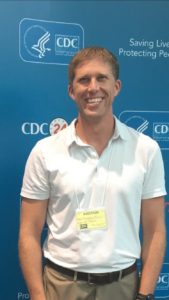“As a science nerd, I was awestruck”
This July, teachers from across the country will gather at the CDC headquarters in Atlanta, Georgia for the CDC Science Ambassador Fellowship. This five-day professional development program targets teachers and educational leaders interested in bringing public health sciences into middle- and high-school classrooms.
Teachers aren’t required to have a background in public health or medicine, but one current fellow does: Dr. Christopher Jenson, who spoke to us about why the program was such a natural fit for him.
 Dr. Jenson explained that teaching was an unexpected love. In his medical career in ER and urgent care, he taught residents and medical students bedside. When his family needed a more regular schedule to support growing kids, he shifted his focus to the science classroom.
Dr. Jenson explained that teaching was an unexpected love. In his medical career in ER and urgent care, he taught residents and medical students bedside. When his family needed a more regular schedule to support growing kids, he shifted his focus to the science classroom.
“I became non-clinical as of January,” explained Jenson. For a while, he was practicing medicine and teaching in the classroom.
Now, with additional training from the CDC, he brings a public health mindset into the science classroom, focusing on four questions to drive problem solving.
“What is the problem? What are the causes for the problem? What is the proposed solution? How will you implement it?”
He says that the program is friendly and exciting, bringing together teachers from all different education backgrounds and career stages. With additional follow up, teachers took the concepts and strategies that they learned in Atlanta into each of their classrooms.
Not every student in his class wants to be a nurse or physician, so fellows are trained in strategies to make science work for everyone. “The kid who wants to be an architect can still benefit from this thinking,” said Jenson.
The CDC Science Ambassador Fellowship inspired him to double down on problem based approaches across disciplines, ranging from outbreak simulations with embedded math, to heart valve prototyping with a dash of physics.
From CDC directors to public health scientists at the top of their field, everyone was more than willing to volunteer their time with the teaching fellows. He even attended presentation from Harold Jaffe and James Curran – “some of the lead scientists who cracked HIV/AIDS.”
“It was the most productive and enjoyable conference I’ve ever attended…It honestly has changed my teaching.”
The fellowship and summer course are free of charge. However, participants are responsible for all costs related to the fellowship and summer course, including lodging, food, and transportation to Atlanta, Georgia. No other travel is required. Past participants have received grants to support costs. It is the fellows’ responsibility to seek and acquire funding.
Apply before January 15th to be considered for the class of 2018. Visit the CDC website or watch this video for more information.
